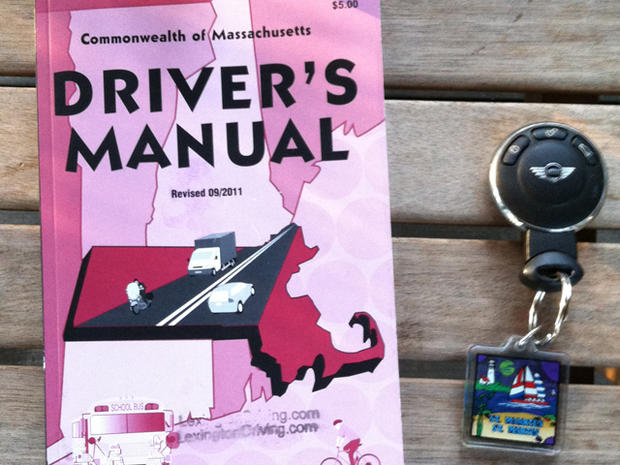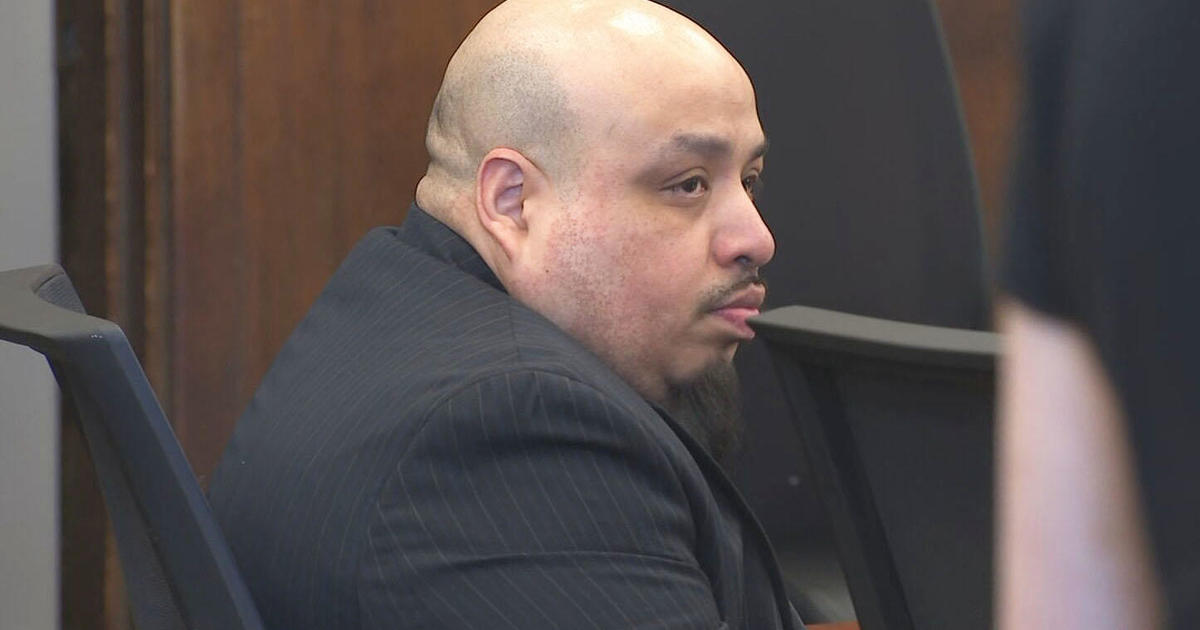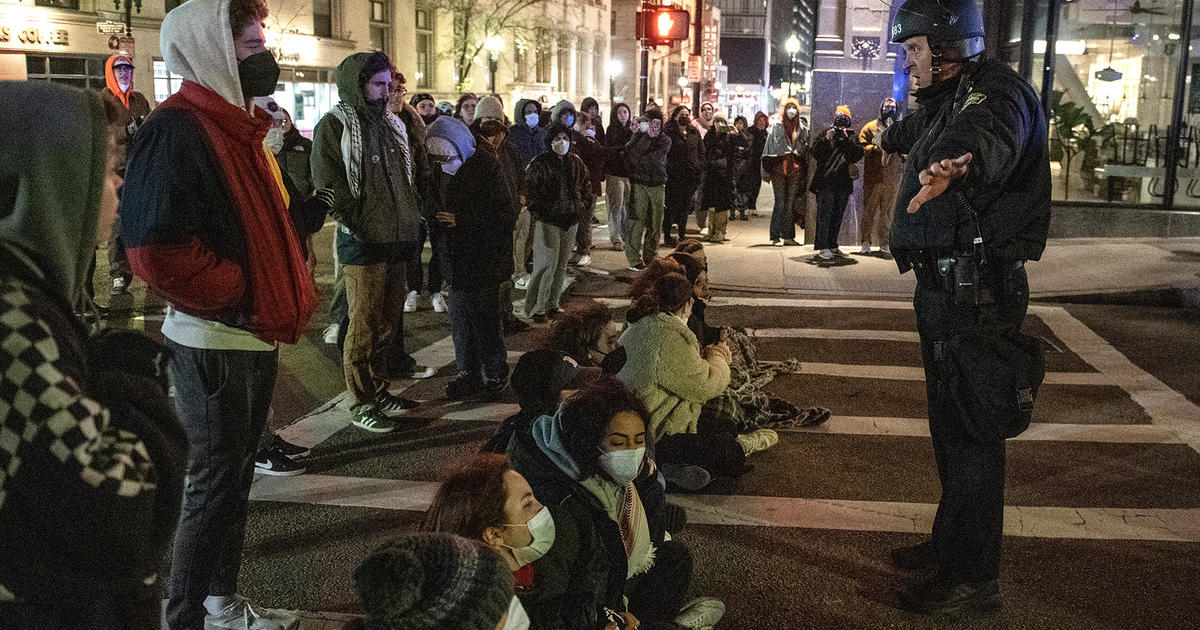Brain Injury: My Road To Recovery - Regaining Independence
BOSTON (CBS) - "Left, right, stop or slow down." After more than 30 years of driving, last October I found myself once again demonstrating to the RMV that I know my hand signals.
I had suffered a traumatic brain injury in a bicycle fall three months earlier, and a medical competency road test was deemed necessary before I could get behind the wheel again.
Ironically, my 16-year-old son Luke had received his junior operator's license the week before, so HE gave ME pointers!
I had to ask him, "How bad was I?" He smiled and said, "You were pretty bad. I'm not gonna lie. You had a lot of things wrong. You didn't know how to straighten out the wheel without letting it slide through your hands. You couldn't really park on a hill, and did not head check at all. You probably wouldn't have lasted 20 seconds in the road test. They would have failed you before you started the car."
Listen: Mary Blake: My Road To Recovery - Part 7
Podcast
Registrar Rachel Kaprielian says medical competency tests aren't that unusual. On average, roughly twenty of them are administered around the state each day.
"We work with patients and their doctors to ensure that they are, in fact, ready to try the competency exam, and that's the whole point of the competency exam." She continued, "If you've had an injury, or an incident that prevents you from driving, that may not be the permanent state of things. So, the Registry is interested and the state's interest is in making sure that people are capable and competent to drive so that they're safe and everyone else on the road is safe."
Kerry Wigandt, program coordinator for the RMV road test program, was my tester. She did not know my line of work or background prior to the test, but wasn't surprised when I confessed to her afterwards that I had been a nervous wreck.
"A lot of people, I think, get overly nervous," she said, "but, just as long as you're cautious on the road and you're showing that you're looking for your blind spots, that you're aware of your surroundings and you drive defensively, assuming that people will always jet out of nowhere, you're good."
RELATED: Listen to previous reports in this series
While brain fatigue continues to be my biggest challenge, my biggest feeling of accomplishment was being able to drive again and regain that independence.
I got the high five from my son when I passed. I later asked him, "How did you feel when I told you I probably couldn't have done it without you helping me?"
"Kind of important," he replied.
My therapists told me family support is incredibly helpful for recovering traumatic brain injury (TBI) patients, and truly, I found the support of my family, friends and work colleagues invaluable these past six months.
But it's not always easy for them.
Lee Woodruff's husband, Bob Woodruff, an ABC News journalist, suffered a TBI in a roadside explosion in Iraq in 2006.
"It's hard," she said. "I think there's those moments when something will happen, like he won't get the joke, or whatever, and I'll think okay, was that just because he's a space cadet, or is that the brain injury, and what you have to learn to do is say that none of that matters. This is where we are now. I hate the term 'new normal' so I'm not gonna use it, but this is where we are now, so this is what it is."
Depression and headaches are often silent and unwelcome companions that accompany TBI's. My doctor, Ross Zafonte, a pioneer in the treatment of traumatic brain injury, tells me each time he sees me that 53 percent of TBI patients suffer from depression.
We're learning much more about depression and headaches that result from concussions in sports.
Dr. Eric Mahoney is a trauma acute care surgeon at Boston Medical Center and he clarifies the definition of a sports concussion.
"Concussion is a form of traumatic brain injury," he said. "It's a spectrum. You can have a simple head injury, for lack of a better word, that is concussion without a lack of consciousness, all the way to severe brain injury that is immediately life-threatening and fatal, so it is a spectrum. But, it should never be minimized because every person will react differently to it and the impact to that person needs to be taken seriously and into account."
Chris Nowinski is Executive Director of the Sports Legacy Institute here in Boston. He has written the book "Headgames" and was also involved in the production of last fall's acclaimed documentary of the same name.
Like me, Nowinski learned about traumatic brain injury the hard way.
While I had fallen off a bicycle, he injured his brain while playing football at Harvard and later while wrestling with the WWE.
"I ignored every concussion I ever got, not knowing any better, not even realizing they were concussions. They caught up to me in the summer of 2003 when I was 24. I had developed five years of symptoms after a bad concussion that I had fought through for five weeks, until I couldn't fight anymore," he recalled.
I asked him how he's doing now.
"I really struggled with headaches for five years. I had 3-and-a-half years of sleepwalking problems and then I got better for the most part, although I've still never been able to exercise at 100 percent without getting nauseous, so it's a sign that something is still going on in there," he replied.
Nowinski says with brain damage comes an awful realization, a realization that I experienced, too.
"Your brain just refuses to think about itself. Then when you realize you've damaged it, you realize you would trade anything, anything in the world, not to damage your brain. The rest of your body you can fix, or can adjust, but when your brain's gone, you're nothing," he said.
Listen: Mary Blake: My Road To Recovery - Part 8
Podcast
Dr. Jim Holsapple, chief of neurosurgery at Boston Medical Center, says it's sometimes difficult to watch sports on TV.
"You can imagine why a neurosurgeon like myself shudders, when flipping through the channels, I come across a boxing match. I see athletes throwing powerful punches at each other's heads. I mean, a neurosurgeon cannot help but imagine how the brain is shaking around and moving and bumping inside the head as this is happening. It's an unpleasant thing to watch," he said.
Nowinski says he is encouraged that this message is beginning to sink in.
"Everyone knows concussions are bad for you now." He continued, "We measure success by legislation. There's now over forty states that now mandate education on concussions and you can't go back the same day. We measure success on research. There wasn't a center in the world focused on research on the long term consequences of Chronic Traumatic Encephalopathy, a degenerative brain disease. Even though we knew about the disease since 1928, we started the first center in 2008 at Boston University, focused on it. Now there's more people working on this than anywhere in the world."
Nowinski has this advice for parents.
"Get educated and become an activist, because most of these sports can be played safely but we're not doing it because we're not following the simple things we know we should do," he said.
Coming up in our next chapter - my lessons learned.




